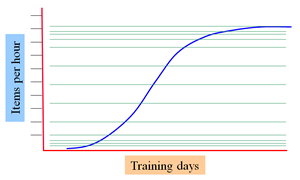Goal setting part 2
Limiting performance
If you set a large goal, and don’t break it down to smaller steps, it can lose some of its uniqueness for individuals.
It’s achievement difficulty can be similar across the board and independent upon the experience and current performance level of individuals.
When you breakdown a goal into smaller parts it gives you the opportunity to tailor the goals according to initial ability.
This is most easily seen in the setting of goals via percentages.
Asking for a 5% improvement may be easy for some and very hard for others.
If we split our work force into three levels, low, medium and high performance achievers we can then set goals more appropriately.
- Low
In this case experience and technical abilities may be low. Setting goals too high here may lead to non achievement and hence little opportunity for positive reinforcement. This can lead to these persons losing motivation.
- Medium
Here individuals will be able to meet goals a little more easily owing to the fact that they have appropriate experience but are only performing below their potential. That is, it is easier here to see improvement.
- High
These people are already performing at a high level and will find it hard to make great leaps in performance.
Hence, modest goals will be more appropriate here.
Note that the setting of small goals will give you much more opportunity for positive reinforcement and will gradually lead to a rise in overall performance.
Setting the goals too high can cause disappointment which may lead to a drop in performance.
Patience
Any aspect of teaching, managing or coaching requires that you lead the individual toward a given goal.
This can best be done using the technique of setting small goals and taking the opportunity to positively reinforce on a frequent basis.
This process of designing small steps to lead to a greater goal is known as ‘shaping’.
Skill learning
When we try an learn any skill, for example, playing the piano, solving a puzzle, improving sporting skills we know intrinsically that we have to start at the beginning and progress in small steps.
When you receive appropriate positive reinforcement you want to learn more often.
You practice more, you see greater achievement, you enjoy it more and your skill increases rapidly.
In other words, you learn in small steps which are positively reinforced.
When managers set goals the principle is just the same but they believe that we can make the goals a bigger jump.
This usually reduces motivation and reduces performance to just enough to get by.
Benchmarking
Benchmarking can be dangerous.
This is the practice of setting your standards against a benchmark of performance by the ‘best’ in the industry.
The trouble with this is the best in the industry are already working at a high level of performance.
Hence, a benchmark may be very hard to achieve for low performers and easier for those at the top.
For low performers this can be very discouraging. Try to celebrate achievement.


